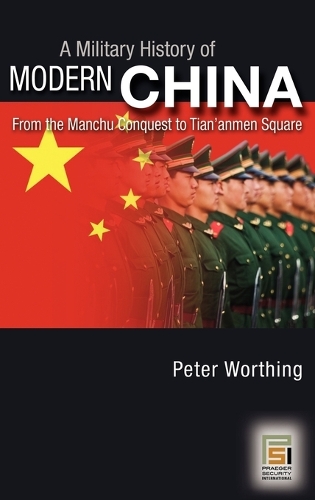
A Military History of Modern China: From the Manchu Conquest to Tian'anmen Square
(Hardback)
Publishing Details
A Military History of Modern China: From the Manchu Conquest to Tian'anmen Square
By (Author) Peter Worthing
Bloomsbury Publishing PLC
Praeger Publishers Inc
30th September 2007
United States
Classifications
General
Non Fiction
355.00951
Physical Properties
Hardback
240
Width 156mm, Height 235mm
539g
Description
War and the military have played central roles in shaping modern Chinese history. Worthing demonstrates how these factors have figured decisively in the rise and fall of imperial dynasties, the suppression of internal revolts, the emergence of revolutionary movements, the conduct of China's foreign relations, the development of political parties, the structure of governments, the rise of nationalism and the drive for modernization, all of which have shaped so much of China's modern history. War and the military have played central roles in shaping modern Chinese history. As Worthing demonstrates, the consequences of war and defeat, in both internal and external conflicts, have largely determined the course of history in China, especially in the period since the rise of the Manchu dynasty in the 17th century. Understanding the military history of China is, therefore, essential to an understanding of the Chinese state that is now emerging as a 21st-century military and economic power. Organized chronologically, this book is divided into three sections designed to reveal the manner in which war and the military have influenced the course of Chinese history.
Reviews
Armed struggle has played an important role throughout the history of China. The majority of China's imperial dynasties rose and fell due to success or defeat upon the battlefield. The 20th century saw the conflict between Nationalist and Communist forces that resulted in today's divided China: the Peoples Republic of China (PRC) and Taiwan. It also witnessed China's intervention in the Korean War and border clashes with its neighbors India, the Soviet Union, and Vietnam. Worthing offers a basic introduction to the military history of China from the Shang Dynasty (c. 1750-1050 BCE) to the present, intended for both specialists and casual readers. The text's 14 chapters are organized along thematic and chronological lines, e.g., Warlords and the Northern Expedition, 1916-1927, The Chinese Civil War, 1945-1949, and The Chinese Military since 1980. Worthing focuses on recurring issues, such as the military as the arbiter of internal and external security, significant military campaigns, and the ongoing effort to acquire weapon systems that would allow the PRC to compete militarily with the major Western powers, notably the US. Highly recommended. Upper-division undergraduate and graduate collections. * Choice *
Peter Worthing's book is a welcome addition to the literature on modern China. In cogent, brisk chapters, he takes on a huge subject, and covers it with great thoroughness. His book will give the Chinese military its proper place in modern Chinese history, and in international military history, as part of the Praeger series on military history. Worthing's book will also provide, for the many non-academics who need to know about the Chinese military, an excellent introduction to the contemporary Chinese military and its origins. * War in History *
[T]he book is a succint and highly readable account of the history of wars and military institutions in China from the late imperial period to the present day. The extent of its coverage distinguishes itself from other similar surveys. . . . [C]ollege teachers should find it very useful. * The Historian *
Author Bio
Peter Worthing is Associate Professor of History at Texas Christian University. He has a PhD in modern Chinese History from the University of Hawaii. He is the author of Occupation and Revolution: China and the Vietnamese August Revolution of 1945 (2001) and several articles on Chinese military history in journals such as The Journal of Military History, Modern China, and The Journal of American-East Asian Relations.
